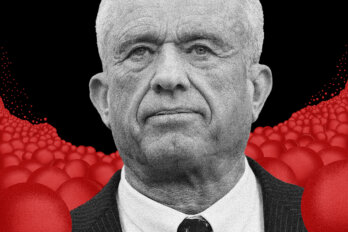When he’s guest lecturing grad students or clinicians in training, brain scientist James Cantor will sometimes throw out a question to the audience. “How do you suppress your sexual interest in children?” The students are understandably tongue tied. “They’ll look at me like I have three heads,” he says. He might then come at them with another unanswerable question: “When did you choose to be attracted to adults?”
Cantor’s point is obvious: “We don’t decide what we’re attracted to. We just figure it out.” It’s a similar rhetorical parry to the one gay activists used to challenge homophobia. While you can, if you look for them, still find clusters of zealots who believe that homosexuality is a choice, few people doubt that humans are born straight or gay, but many are hesitant to apply the same logic to pedophiles—one of the demographics that Cantor studies.
These discussions can lead to uncomfortable questions. Chief among them: if pedophiles, like virtually everybody else, acquire their sexual orientation through no fault of their own, is the condition immoral? And how do we ask that question in light of the inescapable fact that there is no moral ambiguity around the abuse of a child?
That’s exactly where Cantor, a psychologist at the Centre for Addiction and Mental Health (CAMH) in Toronto, comes in. Only, he’s not just asking questions. He’s trying to provide answers. Answers based on science. Answers that are still uncomfortable.
Since 2006, Cantor has been conducting large-scale brain scans of pedophiles, helping amass evidence that the condition is biologically predetermined. He’s one of only two leading clinicians in the world doing such research using neuroimaging—the other being Klaus Beier, in Berlin. “Most mental health professionals encounter few, if any, genuine pedophiles and find the topic aversive,” says Cantor. Plus, money for such research is scarce. “Funders and fundraisers are very conscious of the optics,” he says. “They do not want to risk an association with such a negative topic.”
The situation is both understandable and unfortunate. Because, if we’re serious about protecting kids from predators, doesn’t it make sense to understand those predators? Even if it means letting go of some emotionally satisfying, fear-based preconceived notions—like, for instance, that people who are sexually attracted to children deserve to be called predators.
So while Cantor’s work is rooted in the data-driven scientific method, his findings are inescapably political. Nobody, says Cantor, should be stigmatized for a sexual orientation they didn’t choose. He is careful, however, to distinguish between pedophilia (which he considers a biological condition, and thus morally neutral) and the act of molesting a child (which is certainly not). A culture that no longer demonizes pedophiles, he argues, may be one in which pedophiles themselves are more willing to seek help—and therefore one in which children are less likely to be abused.
I interviewed Cantor in his austere office buried within CAMH’s labyrinthine College Street campus. He’s trim and neatly dressed: fitted jeans and a black open-collared shirt. At fifty, he says, he no longer needs a necktie to convince people he’s serious.
Any scientist doing controversial work is going to be called on, repeatedly, to defend his ideas. It doesn’t hurt that Cantor is charismatic and funny, given to wild hand gestures and stagey diction. His old-timey New York accent comes out whenever he gets riled up (which is often), and he has a serious case of what he calls “middle-aged Jewish face,” which puts even the wariest critics at ease. You can imagine him tap dancing or impersonating Lenny Bruce.
Cantor grew up on Long Island, New York, and studied computer science at Rensselaer Polytechnic Institute, a nerd mecca, which he lovingly calls “junior Vulcan school.” Upon learning that he had neither the stamina nor the aptitude for high-level software programming, he retrained in psychology, hoping to one day help young gay men, like himself, manage the coming-out process. After graduate studies at Boston University and McGill, he arrived at CAMH, where he interned under Ray Blanchard, head of the institute’s Sexual Behaviours Clinic and a giant in the field of sex research.
Blanchard, now retired, was a formidable researcher whose finding sometimes challenged activist pieties. In the early ’90s, Blanchard began working on a series of studies indicating that gay men are more likely than straight men to have older brothers. The phenomenon, called the “fraternal birth order effect,” even applies when men are raised separately from their siblings, suggesting that a predisposition to male homosexuality is biological in nature. That idea is commonplace today, but at the time, it undermined radical feminist arguments that sexual orientation is a social construct.
Blanchard also had a long-standing interest in paraphilias—sexual urges that may lead to extreme, risky, or illegal behaviours—dating back to the ’70s, when he worked at a correctional institute in Brampton, Ontario. When Cantor arrived at CAMH in 1998, the Sexual Behaviours Clinic was treating some 300 sex offenders per year—people whose rap sheets included child pornography, molestation and sexual assault—giving Blanchard access to a large sample of an otherwise marginal population.
To study this demographic, Blanchard needed a clinical intern with Cantor’s skillset: familiarity with brain research, facility with data, and unflinching curiosity about the human sexual system. Other scientists had done preliminary research suggesting a link between pedophilia and the brain. Following this lead, Blanchard and Cantor compiled neuropsychiatric data on their subjects. They learned, for instance, that pedophiles tend to be shorter than most men and have an average IQ deficit of 10 to 15 points, factors that suggest a pre-birth event that altered the typical course of development. They also discovered that pedophiles are three times more likely than non-pedophiles to be left-handed. This fact may seem trivial, but it hints at a biological contribution, since handedness is usually determined well before birth. Fetuses will suck the thumb of the hand that they will later write with as adults.
None of this material proved anything, but it was enough to convince the Canadian Institutes of Health Research to fund the world’s largest MRI experiment on pedophiles, published in 2008. Through the Toronto Western Hospital, Cantor scanned the brains of sixty-five sexual offenders, most who’d been referred to CAMH through parole or probation officers. He was hoping to find irregularities within one or two major brain centres—previous theories linked pedophilia to the frontal or temporal regions—but what he saw was initially disappointing. “We found nothing, nothing, nothing anywhere on the surface of the brain, which is where we had hoped to see results,” he says.
In desperation, he and his team examined the white matter tracts, a then overlooked neurological region that, arguably, isn’t a region at all. (If you think of the brain as a village full of people, the white matter tracts are the telephone wires that enable them to communicate.) Cantor noticed strange, C-shaped zones of decreased white-matter density in his sample group. “My first thought was, Thank God, we have something,” he says. “My second thought was, What the fuck does it mean?”
In hindsight, the discovery makes sense. In the eight years since the study came out, researchers have learned that sexual arousal doesn’t reside in any single brain centre. It involves various functions (sensory, motor, emotional, etc.) that communicate through the white matter system—exactly where Cantor found his irregularities. Cantor now believes that pedophilia could stem from a cross-wire effect, where stimuli that should not be processed as erotic—say, the sight of a child—are sent to the wrong parts of the brain. That theory contradicts ideas that pedophilia results from childhood abuse or poor parenting—or that pedophiles are just naturally sadistic people. The disorder is unspeakably monstrous in the eyes of society, but from a clinical, neuroscience perspective it’s a communication error.
It is, however, an extremely consequential error, both to children who have been abused and, more controversially, to pedophiles, whose lives are often mired in depression, isolation, and shame. Cantor is deeply sympathetic to both groups, although he is more often in contact with the latter, who reach out to him anonymously online, often because they’ve read about his work in the media.
He finds the emails from teenage pedophiles to be the most upsetting. “It’s a curse,” says Cantor. “These people are saddled with a sexual orientation that they can’t express in any way, and Lord knows there is nothing more powerful than a man’s sex drive.” Pedophiles, he says, experience desire, affection, and heartbreak as strongly as anybody else. “It is a deep, dark, long-lasting ache, and they can’t tell a soul.”
Consider the hypothetical case of an eighteen-year-old. Let’s say that, six years ago, he was interested in kids his age. Now though, he’s realizing that the kinds of people he’s attracted to aren’t getting any older. He’s experiencing sexual urges with the same intensity of his peers, but he has no ethical way of acting on his desires. His frustration and shame is compounded by the confusion of late adolescence.
So, what does he do? Let’s say he’s as rational as any eighteen-year-old. He’s a good kid. Ideally, he’ll have the clarity of mind to seek professional help, but if he lives in the US, he has a strong incentive not to. In many states, a therapist is obliged to contact law enforcement or child-protection services when a patient reports pedophilic desires. If he lives in Canada, his chances are better, but given that his sexual orientation is so firmly a taboo, he will probably decide to keep his secret to himself.
Clinicians, Cantor says, can help patients live offense-free lives through therapy and, for those who want them, libido-reducing drugs. Now, these treatments are available to convicted offenders, but how do you convince non-offending pedophiles—a demographic that researchers know very little about—to come forward? If this hypothetical eighteen-year-old goes it alone, he won’t have a support network, a counsellor, or medication. He’ll be trying, without help, to prevent himself from acting on his sexual desires. He may well be consigning himself to a state of ongoing secrecy and desperation, and research shows that pedophiles are most likely to offend when they’re feeling desperate.
This can’t possibly be the best-case scenario, says Cantor. If, in the end, the man does offend, he could be forced into therapy and then may be given the tools to avoid recidivism. But wouldn’t it be better if he’d sought counselling earlier on? “Our system helps to prevent second-time offenses,” Cantor says. “But if we look at what the science is telling us, we can prevent the first offense. And it’s insane that we’re not doing that.”
There is a vast difference between desires and actions. For some, no gulf between the two is large enough. Cantor’s position, obviously, engenders its share of Internet blowback. The cranky conservative site WorldNetDaily, known for speculating about Obama’s citizenship, warned that, by seeking to de-stigmatize pedophilia, Cantor may help normalize sexual relations between adults and children. Online readers responded to a Daily Mail article on Cantor with outrage. One opined that the only acceptable treatment for pedophiles “is a lead injection to the back of the head.”
Within the scientific community, though, Cantor’s research has been mostly well received. His main opponents are those who believe that an attraction to children can be overcome through counselling. In a 2014 study, for instance, clinicians in Hamburg, Regensburg, and Ottawa made precisely that argument, but Cantor accused the researchers of flawed data analysis and wishful thinking. (I contacted other people in the field, who also reported doubts about the study and its methodology.)
It’s a bleak conclusion, but Cantor believes that there’s currently no way to make pedophilia go away. (He likens such treatments to spurious gay-conversion therapies.) The best our system can do, he says, is fix the laws.
Despite the difficult nature of his subject matter, Cantor found a powerful ally in Dan Savage, the American sex columnist and podcaster, who contacted Cantor in 2010 when pedophiles started seeking his advice. Cantor, now a semi-regular guest on the Savage Love podcast, brings scientific legitimacy to a tricky subject, and Savage gives Cantor an international platform. “The timing was right for a public discussion about biology and pedophilia,” says Cantor, “but Dan Savage was the first person with the balls to say it out loud.”
Savage, himself a father, understands why people freak out at the very notion of pedophilia. “There is something about being a parent that makes you crazy when the subject of kids comes up,” he told me, over the phone from Seattle. But Cantor’s research, he says, makes intuitive sense. “People still have the attitude that pedophilia is a matter of choice. But why would somebody say, I choose to ruin my life? I choose to be a monster?”
I listened to Cantor’s original appearance on Savage Love when it first aired more than five years ago. A young man—not too different from the hypothetical character I discuss above—called in to the show. “I have a pretty strange fetish that is considered illegal,” he said, haltingly. Then he put his cards on the table: “I guess you could call me a pedophile.”
Cantor explained that pedophiles aren’t sociopaths: brain research shows that they’re capable of moral judgments. He also said that people don’t often hear about non-offenders—what Savage, on the show, calls “gold star pedophiles”—because they live in secret. It was a calm, candid conversation, the first I’d heard on the topic that didn’t tumble into moral hysteria.
Over email last year, I asked Cantor if growing up gay in Reagan’s America made him naturally sympathetic to outsiders. I instantly felt guilty for making what felt like a clumsy comparison between a scientist and the people he studies. When I met Cantor a few days later, he told me that my hunch was right. “I know what it’s like to be different from everybody else, to have a secret and feel unable to tell anybody,” he said. “Being gay was hard enough, but I could eventually come out. These guys have no such opportunity.”




